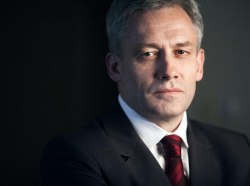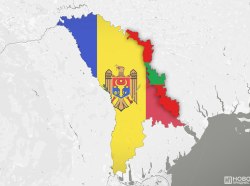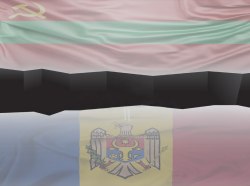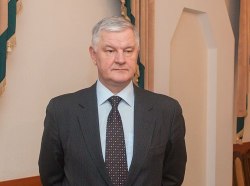All recent months, while the democratic system is fully preserved in the Pridnestrovian Moldavian Republic, while all mass media and Internet resources are available to people, while the tariffs for housing and communal services remain at an acceptable level for the population – at this time, there is a systemic crackdown in the Republic of Moldova.
This is no coincidence. The absence of experienced professionals in the ruling group that came to power in Moldova in 2020-2021 led to a wild increase in utility tariffs and the failure of negotiations with Russia on gas supplies for Moldovan consumers. As a result, the standard of living of the inhabitants of Moldova collapsed, while the positions of the pro-Western and at the same time pro-Romanian authorities of the country were completely undermined. Against this background, at the end of 2022, Moldova was shocked by the protests of the opposition forces, which gathered huge, by Moldovan standards, protest rallies in Chisinau and other settlements, including the Gagauz Autonomy.
Instead of revising their socio-economic policy, dictated by such Western institutions as the International Monetary Fund and the World Bank, the Chisinau authorities began to look for a way out of this impasse in confrontation with Russia and the separation of Moldova from the Commonwealth of Independent States (CIS). All those who expressed their, even timid, disagreement with what was happening were called Kremlin agents and were subjected to persecution and repression.
The Pridnestrovian Moldavian Republic, faithful to its principle of non-interference in the internal affairs of other countries, watched with alarm the growth of anti-democratic, authoritarian tendencies in the politics of those in power in Chisinau. Tiraspol has consistently advocated and continues to advocate, regardless of who is at the driving seat of the Moldovan state ship, for equal negotiations on the settlement of the long Moldovan-Pridnestrovian conflict, for mutually beneficial cooperation between the banks of the Dniester in all areas and for maintaining the 5 + 2 negotiation format that has proven its effectiveness.
Nevertheless, the events of February 13 in Chisinau cannot but rise concerns of the Pridnestrovian side, which is vitally interested in maintaining peace and stability on the Dniester. On this day, the President of the Republic of Moldova, Maya Sandu, held a briefing in Chisinau, where she directly accused Russia of intending to carry out a state coup in Moldova.
In her opinion, the Kremlin's plan "provides sabotage involving people with military training, disguised as civilians, to carry out violent actions, attacks on Government buildings and capture of hostages." She also believes that the Russian “plan also provides for the use of foreigners for violent actions. For example, the materials contain instructions on the rules for entering Moldova for citizens of Russia, Belarus, Serbia, and Montenegro.”
Of course, she could not help accusing the internal opposition of participation in this plan: “In implementing the plan, the criminals are counting on some internal forces, in particular on criminal groups such as the Shor party, some veterans, former law enforcement officers and people known for their links with Plahotnuk.” By the way, for its part, the opposition denied these accusations and announced new protest rallies on February 19th.
Then M. Sandu went all in and de facto made a bid for a break between Moldova and Russia predicted earlier by several experts: supposedly Moscow aims to “overthrow the constitutional and legitimate Government in Chisinau to an illegitimate”, pro-Russian one, “so that Russia could stop the process of European integration of the republic. She summed up her idea: “The Kremlin’s attempts to escalate violence in our country will not succeed.”
And finally, the main conceptual component of the entire presidential structure followed: the Parliament of Moldova should adopt bills as soon as possible that will give the SIS and the prosecutor's office the necessary tools "to more effectively deal with risks to the country's security." Opponents of the Government immediately announced attempts to "usurp power."
The task of the Pridnestrovian side does not include putting forward versions of whether M. Sandu's step on February 13 is an independent action or whether it was dictated by the West and Romania to create another hot spot on the territory of the former Soviet Union. More importantly, despite some controversy and implausibility of the details of the alleged Russian “plan” (some kind of “hostages”, the capture of which does not solve anything, fastening citizens of Russia, Belarus, Serbia, and Montenegro to the “plan” instead of less suspicious ones to perform such tasks “specialists” from neutral countries, pointing the “most exalted finger” precisely at their opponents, who recently fell under Western sanctions, etc.) all this unequivocally leads to the elimination of democratic norms in the life of Moldova. And at the same time the establishment of an authoritarian model of governance, which the least diplomatic analysts already call a dictatorship.
As already mentioned, the PMR does not intend to interfere in internal Moldovan affairs, but the anti-democratic tendencies in the politics of the “neighbors” cannot but worry Tiraspol due to the likelihood of unpredictable steps by our negotiating partners. As practice shows, for example, in Georgia in 2003-2008, as the dictatorship of Mikhail Saakashvili grew, both actions were observed to virtually liquidate the Adzharian Autonomy and an attack on the independent Republic of South Ossetia. It is known what troubles this brought to many people, including the population of Georgia itself. Today, the leadership and people of Georgia take a balanced, restrained position and do not want their country to be drawn into anti-Russian adventures.
Surely, all the above events will not force Pridnestrovie, firstly, to abandon democracy as the basis of its state; secondly, from a firm commitment to negotiations with Chisinau, including the preservation of the 5 + 2 format. Recently, this approach was once again confirmed by the President of the PMR Vadim Krasnoselsky.
But at the same time, what is happening once again confirms the lack of alternatives to the current peacekeeping format on the Dniester, when peace and stability are kept by the soldiers of three sides - Russia, Pridnestrovie, and Moldova itself. It can be assumed that after February 13, Moscow and Tiraspol, all the more, will not agree to change this format, since even the slightest risk of aggravating the situation in the Security Zone of the Moldovan-Pridnestrovian conflict is unacceptable. It would be irresponsible for all people, regardless of which bank of the ancient river they live on.
It remains to be hoped that, no matter how events develop in Moldova itself, the authorities of Chisinau will retain their positions of realism and will not try to dismantle the mechanisms that have allowed maintaining peace on the Dniester for 31 years.
Andrey Safonov, political scientist








